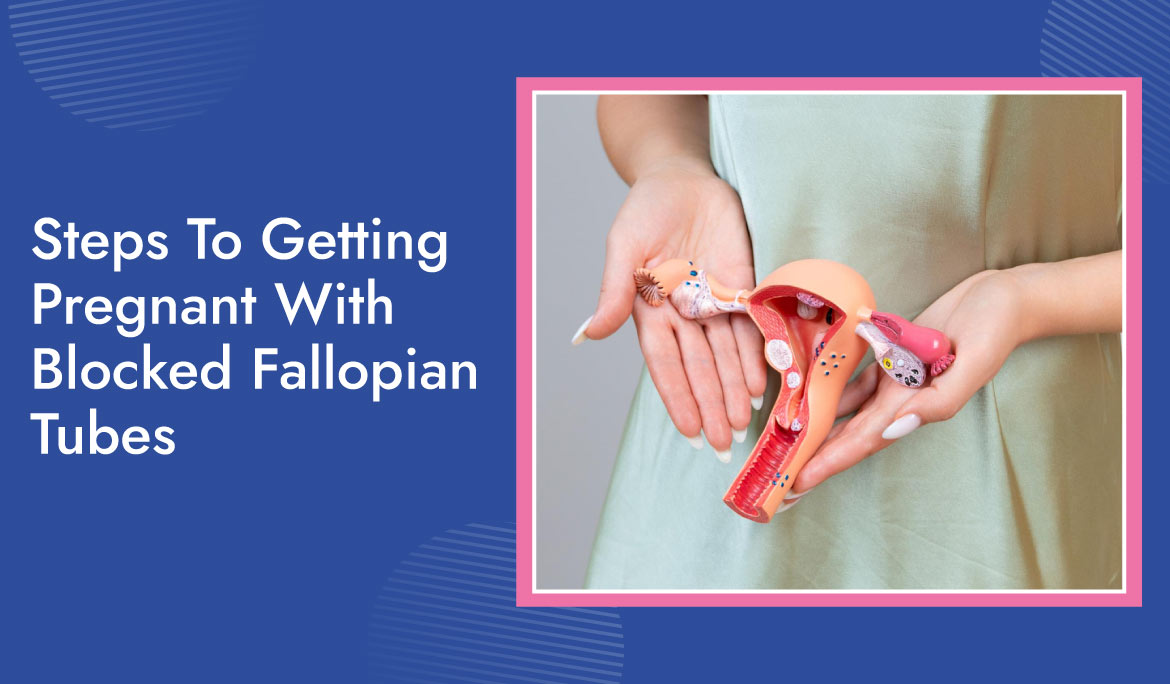Are you dreaming of motherhood, but you’re struggling with infertility? You don’t have to deal with this anymore. A blocked fallopian tube could be a disheartening problem for women and leave them worrying about their chances of conceiving. The good thing is, there is hope yet! In this guide we will understand what fallopian tube blockage is, its diagnosis, and the best way of getting pregnant with blocked fallopian tubes. Let’s explore the possibilities.
Take control of your fertility journey. Consult our expert today!
A] Understanding Fallopian Tube Blockage
Fallopian tube blockage is a consequence of past infections, such as pelvic inflammatory disease (PID), which can result in scar tissue and a blockage within the fallopian tubes. Endometriosis is another reason which obstructs these pathways. This is a condition where tissue from the uterus grows outside its location. Previous surgeries in the pelvic region, while sometimes necessary, can accidentally cause adhesions that hinder the tubes from working properly.
So what makes these tubes so important for getting pregnant? At the fallopian tube, sperm and egg meet and provide the ideal environment for fertilisation. After that, they transport the fertilised egg to the uterus for implantation.
So, if these pathways are blocked, it naturally raises the question, “Can you get pregnant with blocked fallopian tubes?” Infact It is important to know how and why fallopian tubes function in order to address infertility.
B] Diagnosis: How to Know If Your Tubes Are Blocked?
Maybe you’ve noticed your periods now cause more pain, and sometimes sexual intimacy is painful in a way it wasn’t before. Perhaps you’re seeing discharge, or your cycle has gone haywire lately. These could be early signs that something’s not quite right with your reproductive system and shouldn’t be ignored. The following are a few tests, which are part of the diagnosis:
- HSG testing: The pathologist will be injecting through your cervix while taking X-rays, a shorter process than it might appear. The dye reveals where blockages occur and how severe their extent is. Some women say they feel cramping during the test, but most mention that it’s something they can manage and find valuable.
- Laparoscopy: It involves doctors inserting little cameras inside your abdomen. Everything inside your body can be viewed up close by your doctor, such as tubes, ovaries, and any scar tissue. The procedure is carried out under anaesthesia, which means you won’t feel anything, and recovery usually takes only a few days.
- Ultrasounds and Blood Tests: These are the last pieces of the puzzle. Ultrasounds help the doctors to detect ovarian cysts or infections in the ovaries that can cause blocked tubes. However, blood tests can illuminate hormonal imbalances or infections which need attention to be resolved with treatment.
If you notice any of these happen to you, don’t wait for things to improve magically. Consult a fertility specialist in Mumbai, as they give you access to advanced diagnostics and treatment targeted at your problems.
C] Steps To Getting Pregnant With Blocked Fallopian Tubes: Complete Guide
Guide
If your doctor says your fallopian tubes are blocked. What’s next? Fortunately, there are a number of ways you can take. Depending on how bad and where the blockage is, there are different ways to conceive with blocked fallopian tubes.
Natural Methods
If it is a minor blockage or only one tube is affected, natural methods could be a hope. Involving lifestyle changes, certain supplements, or therapies such as acupuncture can be helpful. These methods aim to improve general reproductive health and, in some cases, enhance the function of the remaining open tube. However, there could be possibilities when natural remedies alone won’t be sufficient.
Surgical Options
In some cases, surgeons can remove the blockage and open up the fallopian tubes. Tuboplasty is a surgical process that aims to correct damage within the fallopian tubes. The success of tuboplasty depends on where the blockage is located and how extended it is. However, surgery can bring risks, and it’s possible for the tubes to become blocked once again over time.
Assisted Reproductive Technologies (ART)
If natural ways or surgery are not viable options, ART directly leads the way to pregnancy. IVF has been widely used for years to treat problems with blocked fallopian tubes. The whole IVF process for fallopian tube blockage involves stirring the sperm and the egg together in a laboratory, where fertilisation takes place, then the embryo is placed straight into the uterus without using the fallopian tubes. Many times, ICSI (Intracytoplasmic Sperm Injection) is used during IVF when there are fertility issues related to the man.
Sometimes, other ART methods may also be considered depending on an individual’s unique circumstances. Every option comes with different considerations and success rates, and you should discuss this completely with your fertility specialist.
D] Can You Get Pregnant with One Fallopian Tube?
Absolutely yes! With one healthily functioning fallopian tube, it is possible to conceive. Many women still have successful pregnancies, although they only have one functional tube. If ovulation occurs from that ovary, the remaining tube can still function as a site for fertilisation.
So, if you’re wondering, “Can you get pregnant with one fallopian tube?”—the answer is, fortunately, yes. Many real-life success stories back this, and with proper monitoring and a fertility-friendly lifestyle, your chances can still be significant. Speak to your doctor about ovulation tracking and fertility support to boost your chances naturally.
E] IVF: The Most Common Path to Pregnancy
IVF has become the gold standard for ivf fallopian tube blockage cases because it makes your blocked tubes completely irrelevant to getting pregnant. The process bypasses everything that’s not working and focuses on what is – your ovaries, your eggs, and your uterus.
Success rates are very positive, especially among younger women, as many achieve success rates of 50-70% per cycle with tubal blockage treatment for infertility. Multiple cycles increase the chances, which is why many couples who commit to 2-3 cycles have a strong chance of becoming pregnant.
The process of treatment involves stimulating the ovaries, collecting mature eggs, fertilising them with sperm and placing the strongest ones back in the womb. Treatments for IVF fallopian tube blockage have improved a lot over the years, making them both safer and more successful than in the past.
F] Tubal Blockage Treatment Options
- Fertility Medications: Medication is given when the problem is mild; it helps to improve ovulation and construe natural conception.
- Tubal Cannulation: It is a non-surgical method used to clear small blockages near the uterus.
- Laparoscopic Surgery: Using laparoscopy, a surgeon can safely remove scar tissue or open blocks that may be inside the tubes.
- Tuboplasty: It is an operation to fix fallopian tubes.
- In Vitro Fertilisation (IVF): When blockages are severe or the tubes are badly damaged, IVF is normally suggested.
- Lifestyle Changes: Good nutrition, a healthy weight, and avoiding pelvic infections help during treatment.
- Expert Consultation: Book an appointment with a fertility professional before making any decisions.
G] Emotional and Mental Health Support
Coping with infertility is tough on the emotions. Dealing with frustration, anxiety and sadness can worsen your mental well-being. Sharing these feelings with someone can make it a bit easier to process.
Here are a few tips:
- Manage Stress: Try yoga, meditation or deep breathing as your way to relax.
- Join Support Groups: Meet with other women who have been through the same experience. It feels validating to share both your feelings and your experiences with someone.
- Seek Counselling: An infertility specialist can guide you with useful methods to deal with it.
Remember, you are not alone! Caring for your mental health should be just as important as addressing the physical aspects of infertility.
Conclusion
Wondering, can I get pregnant with blocked fallopian tubes? Because of modern technology and the skills of experts, the answer is yes! Natural methods, surgery, or IVF have allowed many women to bypass tubal blockages and achieve the dream of motherhood. Even though the process may seem hard, you don’t need to do it by yourself.
We are specialists and are here to help you each step through the process. Contact us now to discuss your options and start the journey to become a parent.
Take control of your fertility journey. Consult our expert today!

Dr. Hrishikesh Pai
Dr. Hrishikesh Pai is one of India's leading fertility specialists, with over 40 years of expertise in reproductive medicine and the Founder of Bloom IVF Group. He plays an important role in advancements in fertility care, establishing 11 world-class IVF centres across the country. Dr. Pai received numerous awards and is an Honorary Professor at D.Y. Patil University, Navi Mumbai. He is well known for his compassionate approach and continues transforming lives by fulfilling people's dreams of becoming parents.













